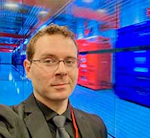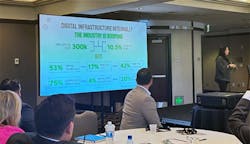Today is International Data Center Day, which this year is focusing on the data center industry making connections, in person, with local K-12 and higher education institutions. DCF contributor Bill Kleyman has been deeply engaged on this topic through his work with the Infrastructure Masons. We asked Bill to share some of his experience and perspective on inspiring the data center leaders of the future.
Education and how we approach the next generation of the data center professionals was a key topic during the most recent iMasons Member Summit in San Francisco, I've been involved with Infrastructure Masons since 2019 and currently co-Chair the Millennial and GenZ Member Resource Groups (MRG). As of 2023, I'm also the interim Chair of the Education Committee.
Over the past four years, I've worked closely with the iMasons team to impact educational curricula, give out scholarships, and design an entire multi-university capstone program. These initiatives have helped many students with mechanical, electrical, computer, and civil engineering majors to join our industry. Further, our focus on working with Hispanic-Serving Institutions and HBCUs has ensured that we get diverse and highly talented individuals.
However, even getting this far hasn't been easy. During the iMasons event, I had the chance to present to the broader community our goals and initiatives for the Education Committee. But first, I asked a question. How many people in the room natively started out in the data center or digital infrastructure industry?
Out of a room of a few hundred people, very few raised their hands. Many of the people in that room were adopted or somehow made their way into this industry. Sadly, this trend is our own doing.
Data Centers Are a Well-Kept Secret
I feel like the odd person here. My undergraduate degree was in network engineering, and I've spent my life working with data center-related technologies. However, over the course of my career, I've personally seen the data center industry go from a well-kept secret to the essential global network we see today.
Our facilities aren't non-descript warehouses. Many digital infrastructure leaders want to showcase their facilities and the technical ingenuity inside. Modern digital infrastructure is really cool! We've seen an evolution in liquid cooling, density, and even new sources of power. Most recently, colocation facilicites became the home of quantum computers. Earlier in March, Equinix announced that it would house a quantum computing system from Oxford Quantum Circuit (OQC) at its TY11 Tokyo data center, helping OQC make quantum services accessible to global businesses.
However, we still have a talent and skills shortage. While our industry is poised to add 300K new jobs by 2025, digital infrastructure leaders have serious concerns. We discussed this in detail during our iMasons Summit.
A recent Uptime Institute report shows that staff shortage affects almost all data center job roles globally. Much of the workforce is aging in mature data center markets like North America and Western Europe. Many professionals expect to retire around the same time, leaving data centers with a shortfall in both headcount and experience.
According to the report, over half (53%) of operators surveyed report difficulty finding qualified candidates for open jobs — up from 47% in 2021 and 38% in 2018. Operators also face challenges with employee retention — 42% report staff being hired away, which is more than double the 2018 figure of 17%. Data center competitors hire most staff who leave, and few are leaving the industry. Roughly one in three (31%) respondents say they are not having difficulty attracting or retaining staff.
To combat these challenges, the industry has been responding.
Data Centers in Higher Education
Over the past few years, new educational curricula have emerged targeting the growing digital infrastructure space. At the college level, several institutions and organizations have stepped up.
In 2014, SMU's Lyle School of Engineering began offering a master's degree in data center systems engineering, becoming the first in the United States to offer a technical multidisciplinary graduate degree. Today, the interdisciplinary master's degree incorporates course contributions from each of the five standing engineering departments: Electrical and Computer Engineering (ECE); Mechanical Engineering (ME); Computer Science (CS); Engineering Management, Information, and Systems (EMIS); and Civil and Environmental Engineering (CEE).
"Our society has become intimately linked to various digital networks, including social media, search engines, e-commerce, gaming, and big data," said Marc Christensen, Dean of the Lyle School. "Data center design is a fascinating challenge due to the millions of dollars lost per second of an outage. The proper management and design of these data centers require a diverse combination of highly specialized skills. SMU Lyle is uniquely positioned to offer a degree connecting all the needed technical disciplines."
The industry and fellow iMasons leaders were quick to pick up on this and contribute. "SMU's Master of Science in Datacenter Systems Engineering program addresses a long unfulfilled need in the data center industry," said Chris Crosby, CEO of Compass Datacenters. "Its comprehensive, cross-disciplinary curriculum provides the breadth of knowledge professionals need for success in this complex industry with numerous interdependencies."
Other institutions are stepping up as well. Northern Virginia Community College, for example, offers an AAS degree in data center operations. The degree or certification program prepares the student for an entry-level position in data centers or companies that support data center functions as a technician, operator, and technologist. The DCO programs immerse the student in coursework that prepares them to earn BICSI Installer 1, Installer 2 (Copper), and Installer 2 (Fiber Optic) industry credentials and an OSHA 10 certification.
Finally, training programs have partnered with schools to offer continued data center studies. As an Associate College of Anglia Ruskin University, CNet Training provides a Master's Degree in Data Center Leadership and Management. The program, designed in collaboration with the industry to advance data center professionals worldwide, focuses on leadership, sustainability, finance, disaster recovery, critical services, and more. The program offers data center professionals high-level leadership and management education tailored to the data center sector.
To overcome the years of working in secret, data center leaders are now looking even further at ways they can impact future talent. With that, we come to grassroots data center education.
Grassroots STEM and Data Center Education
During the iMasons Member Summit, we wanted to make a meaningful impact on how we acquire new talent in this industry. During the session, we heard from a new partner, JASON Learning. JASON's award-winning curricula place students in challenging, real-world situations connected with and mentored by leading STEM professionals.
During the presentation and discussion, Matt Sieloff, the VP of Implementation and Development and a former school principal, talked about a comprehensive JASON Learning curriculum design featuring print and digital materials, hands-on activities, videos, and online games for students, as well as lesson plans, implementation tips, professional development, and a powerful digital platform for educators.
Their vision is that students everywhere will have the same opportunity for authentic exploration, innovation, meaningful and engaging learning in science, technology, engineering, and mathematics (STEM) to deepen their appreciation and knowledge, improve their lives, build careers, and become informed and proactive citizens who will make a better world.
The exciting part was that he discussed how data center leaders could become educators. Matt touched on how they are already placing students with industry professionals from sciences, manufacturing, aviation, etc. So, why not data centers?
There is a real opportunity to start with a younger generation and remove the veil of secrecy, once and for all, from the data center industry. The idea would be to partner students and student groups with digital infrastructure leaders. Have them follow data center operators around for a day. Or have them work in the business side of data centers. Or maybe, immerse a student in constructing digital infrastructure, power, or telecommunication systems. The options to showcase the cool side of our industry are endless.
While working with college-level students is a passion of mine. I'm genuinely excited about these grassroots programs that can get kids excited about digital infrastructure at a much earlier age. Their knowledge of our industry translates to their ability to apply their college studies to the tech space.
I'm excited to see how we've really begun to open our industry to more people. We've come so far in such a short amount of time. The concentrated effort to broaden education and awareness will help this entire industry grow and be successful.







